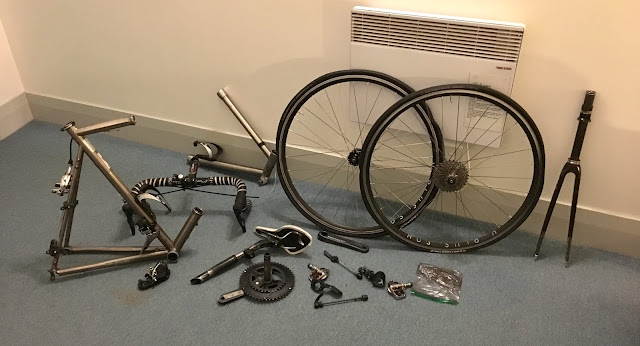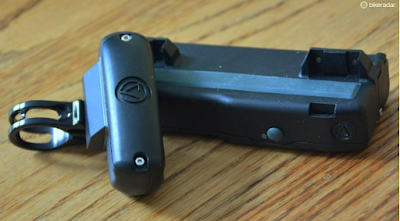 |
| Lots of box, quite small components. I guess the box helps justify the price? |
I bought an "upgrade kit" so kept my current crankset (installed a Shimano Ultegra 6800 crank), rim brakes (I am still using Shimano Dura Ace 7700 brakes which I like far more than SRAM Red rim brakes), and my own 11 speed cassette (a SRAM Red etap cassette would require a second mortgage on my house). I got the "wifli" version that has a longer cage rear derailleur so will work with an 11-32 rear cassette. After changing from 52-36 to 50-34 chainrings, I had gearing for the hills.
The upgrade, from a German mail order shop, cost E1007 or around JPY125,000. Expensive, yet still far less than within Japan (I can find a SRAM etap groupset from Worldcycle, including hydraulic disk brakes ... which are NOT wireless nor usable with a couplered bicycle, for JPY279,000). The same German retailer has a Shimano Di2 Ultegra full groupset for the same price, E1007, including crankset, brakes, cassette and chain. Would it be worth it?
So far, the answer is YES!
My thoughts:
--The set-up is incredibly easy. This is a significant differentiator with Di2, Shimano's electronic shifting groupset.
--It shifts smoothly, effortlessly, and accurately every time. I did have a few chain-drops to the outside, but fixed that with some modest adjustments.
--No shifter cables! No fraying cables. No stuck cables. No jammed cable in the brifter that renders the brifter unusable. No twisted cables. No weight of cables and outer cable housings. And for a bike with S and S couplers, no more cable splitters. SRAM Etap feels to me lighter than the bike did before. (In contrast, Di2 feels (and is) heavier than a normal Shimano groupset. )
 |
| Ready for re-assembly |
--Batteries
Shimano Di2 uses a large-ish cylindrical Li Ion battery that fits in the seatpost, with cables down to a junction box in the seat tube just about the bottom bracket, and further cables to each derailleur and through the down tube all the way to a second junction box under the stem, and more wires to the brifters. Lots of cables to plug and unplug, requiring a special tool. Wiring instructions that one must follow.
SRAM etap is far simpler. No junction boxes. And did I mention no cables? (Just hold some buttons down to "pair" the components electronically the first time you use them. Done.) SRAM has detachable batteries that plug onto each derailleur, plus button batteries on the brifters. The button batteries on the brifters are CR2032 -- available in most stores -- and should last at least a year. (The batteries on the derailleurs are proprietary, but front and rear derailleur batteries are quite small and light, they are the same/interchangeable, and the accompanying USB docking station is also small and light. The one in the rear derailleur lasted me nearly 1300km in Australia, while the one in the front derailleur was still fine after 1500km. If the rear one dies, shift into the small front ring, then swap the usable battery to the rear and you will be able to ride home with plenty of gears. Better yet, on a long ride like PBP, just buy and carry one spare SRAM battery. Really simple and easy.
To stow a bike with couplers, I just take the chain off, unscrew and store the rear derailleur, and I can take the bike apart. (*one cable splitter still for the rear rim brake).
So far, so good. I love etap and am very happy with the upgrade.
I have heard many people who love SRAM etap, but a few who have had trouble with SRAM rear derailleur shifts after break-in period a four or five months ... not sure the percentage, but I will check back in. I am planning to use etap in the summer, for PBP.
So far, Shimano and Campy do not have comparable products.
---------------------------
Meanwhile ... SRAM has already come out with a successor to my version of etap. It is called Etap AXS, and has a 12-speed cassette, and smaller front chainrings with a newly designed crankset including, as an option, integrated powermeter. But that set would be $2000 plus another $1200 for a crankset with integrated powermeter. A $3200 upgrade. Ouch.
--------------------------
I would much rather go in the other direction. Cheaper, simpler.
I see one really nifty idea for eliminating 90% of shifter cables but keeping your existing rear derailleur. It is from a company called Archer Components and appeared on some review sites last year. It is a hybrid -- wireless from your handlebars to a device on your seat stay. You connect your rear derailleur, and the device handles the shifts.
https://www.bikemag.com/gear/tested-archer-components-d1x/
GCN mentions it (or a similar product) in their report from this year' 2019 Taipei cycle show.
https://youtu.be/-zGkaPEJ-K8?t=32
The only complaint from reviews is that it shifts a bit slower than manual or Di2 or etap. The GCN report says this new version allows adjustment in shifting speed (and other features) via a smartphone app.
Last year's version was only for a 1x drivetrain -- single front chainring (no front derailleur). This year's seems for use with "normal" road setups, based upon the GCN report.
That said, 1x may be in my future. Tim Taylor used a nice 1x setup in Tasmania. And there are some attractive 1x setups now out there, with massive rear cassettes in 12 speeds. Maybe 11-42 or even 10-50 12 speed rear and 42 or smaller in front chainring.
The simplicity of the 1x is ideal for randonneuring, not to mention the ease of shifting without doing any mental calculation of how to match front/rear simultaneous shifts when really tired. And 1x is easier to fit with wider chainstays for fatter rear tires!
For my next bike, not this year ... sometime like the Thesis bikes or one of these 22 models ... but from a preferred purveyor?
https://road.cc/content/buyers-guide/237160-22-road-gravel-and-cyclocross-bikes-1x-gearing-can-one-chainring-do-it
















2 comments:
Interesting! Can you program this new version such that it works like
Shimano shifting? I.e. left shifter front, right shifter back? The old eTap
couldn't do that.
Sram stopped shipment of the old 11speed etap which I thought was stupid given the fact that the new AXS etap is at least 50% more expensive. But, rumour has it that pretty soon Sram will lauch a more cost-competitive Force-etap version to go against Ultegra Di2.
Which is by far the most popular electric shifting group.
Post a Comment